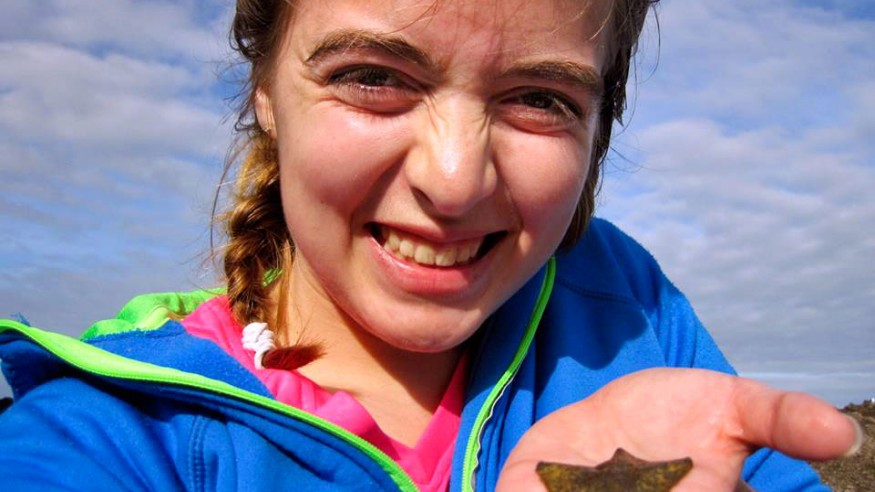
From Delaware to Down Under, and Back
Ohio Wesleyan student Lili Fikter shows off a starfish she found during summer studies with the School for Field Studies in northeast Australia and New Zealand. Fikter spent four weeks with the program. (Photo courtesy of Lili Fikter ’16)
Lili Fikter’s summer study program took her from Ohio Wesleyan University to the other side of the world – the rainforests of northeast Australia and New Zealand.
The OWU junior spent four weeks with the School for Field Studies (SFS), working with 26 other students in the classroom and in the field.
“We were doing rainforest management, so we spent two weeks in New Zealand first, and we looked at the rainforest, different conservation methods being used, different environmental concerns,” she says.
As a triple major studying zoology, geology, and environmental studies, Fikter found her studies at OWU prepared her well for the program.
After New Zealand, the group went to Queensland, Australia, for similar study, particularly involving the diverse plants and animals there.
“They’re places I’ve always wanted to travel to,” Fikter says on why she chose the SFS experience. “I didn’t know much about the rainforest or the ecology or much about it beyond what’s commonly known.”
She learned a lot, though, about the species of both areas.
“New Zealand doesn’t have mammals; all the mammal roles in their ecosystem are filled by different types of birds, so their equivalent to squirrels are bats,” Fikter says.
Lili Fikter met a bandicoot (or ‘little kangaroo’) during her field studies in Australia and New Zealand. After graduation, she hopes to work as a park district naturalist. (Photo courtesy of Lili Fikter ’16)
Australia, by comparison, has many more mammals, many of which hop – including kangaroos, wallabies, and bandicoots (or “little kangaroos,” Fikter says.)
Australia also has lots of snakes and birds, including the flightless cassowary, the closest living descendent of dinosaurs.
While she enjoyed seeing the wildlife, Fikter says a highlight was meeting the other participants.
“It was really cool being around a group of people who were involved in environmental studies to some degree, so we all had that common knowledge,” she says.
“We were also in a beautiful place,” adding the group tried to take advantage of time off. “We went tubing in a glow worm cave in New Zealand and snorkeling on the Great Barrier Reef.”
Like Fikter, who is a member of Delta Zeta, many participants were involved in Greek life — including another DZ, Taylor Melone of Oklahoma’s Northeastern State University.
“It was fun because I got to talk to her and see what her chapter is like, and we talked about similarities we have and differences, it was an instant connection,” Fikter says.
She and the other SFS graduates still stay in touch despite being from across the country, and now compare classes they’re in and how their four-week field education has helped prepare them for class study.
“In general, it made me more sure of what I was doing, and it made me more comfortable with the fact that this is what I want to go into and I am studying the right thing.”
After college, Fikter hopes to work in a park district as a naturalist, specializing in education and public outreach.
“In high school, I did a mentorship with the local park district, and I worked with the naturalist and natural resource management departments,” she says. “I like that it brings together teaching and the environment.”
In addition to the lessons learned, Fikter also earned a $2,500 scholarship from SFS after completing an application and writing an essay following the program.
And, with her senior year still to come, Fikter may well make a return trip next summer.
“I do want to go back to Australia or New Zealand, especially because I was just in far North Queensland, so there’s the rest of the country,” she says, “and that’s a place I really want to go.”
